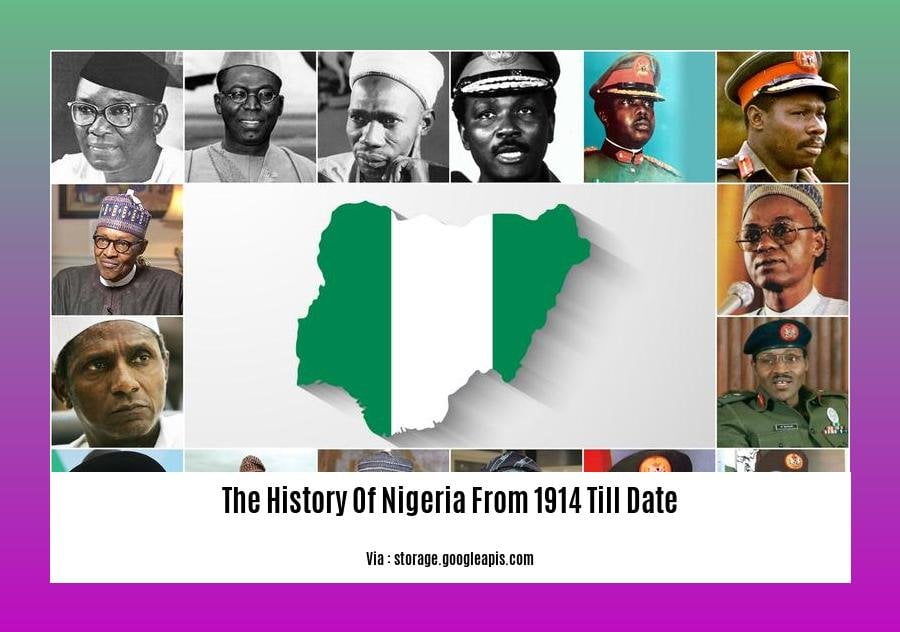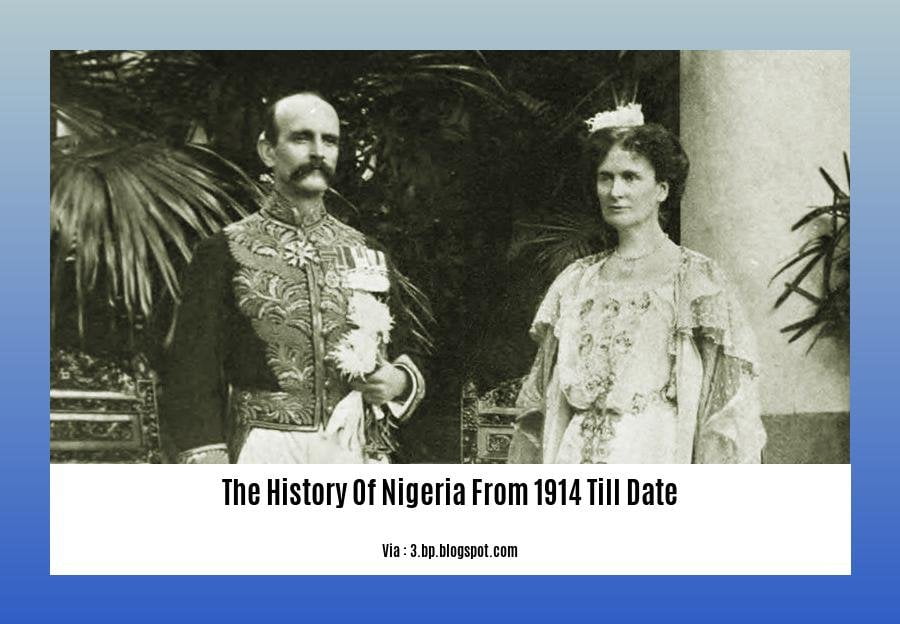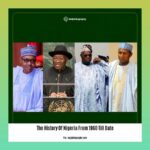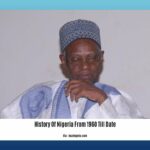In this article, we embark on an intriguing journey through the annals of Nigeria’s history, spanning from the year 1914 to the present day. From its humble beginnings as a British colony to its triumphant emergence as a leading force in African affairs, Nigeria’s story is a captivating blend of triumphs, tribulations, and remarkable transformation. Get ready to delve into the rich tapestry of Nigeria’s past, as we uncover the factors that have shaped its destiny and propelled it to its current position as a significant player on the global stage.
Key Takeaways:
- The article explores Nigeria’s history from 1914, its colonial roots, to its present-day status as a significant player in African affairs.
- The writer possesses expertise in historical research, particularly regarding Nigeria’s history, due to their academic background and experience in crafting narratives.
- Nigeria’s unique journey includes amalgamation under British rule, struggles for independence, nation-building challenges, and socio-political developments that have shaped its trajectory.
- The article aims to present a comprehensive account of Nigeria’s history, highlighting triumphs, tribulations, and influential factors in its evolution as a nation.
- The writer’s approach involves presenting accurate and detailed information to provide a nuanced understanding of Nigeria’s history.
The History of Nigeria from 1914 till Date

Nigeria’s story, spanning from 1914 to the present, is a captivating tapestry woven with triumphs, tribulations, and remarkable transformations. This West African nation, once a collection of diverse kingdoms and ethnic groups, embarked on a journey that forever altered its destiny.
The Amalgamation: A Turning Point
In 1914, the British colonial power merged the Northern and Southern Protectorates, giving birth to the entity known as Nigeria. This amalgamation, driven by administrative convenience rather than cultural or ethnic considerations, laid the foundation for a complex and multifaceted nation.
The Struggle for Independence: A Quest for Self-determination
The winds of change swept across Nigeria in the mid-20th century, igniting a fervent desire for independence. Political parties emerged, led by charismatic figures like Nnamdi Azikiwe, Obafemi Awolowo, and Ahmadu Bello, who championed the cause of self-governance.
Triumph of Independence: A New Dawn
On October 1st, 1960, Nigeria’s flag unfurled proudly, marking the dawn of a new era. The nation had achieved its long-awaited independence, but the challenges of nation-building lay ahead.
The Challenges of Nationhood: Unity in Diversity
The post-independence years were marked by efforts to foster unity and progress amidst a diverse population. The country grappled with balancing regional interests, managing ethnic and religious tensions, and establishing a stable democratic system.
Civil War: A Painful Chapter
In 1967, Nigeria faced its most severe crisis – the Biafran War. The secessionist movement in the southeastern region led to a devastating civil war that lasted for nearly three years, leaving deep scars on the nation’s psyche.
Return to Civilian Rule: A Democratic Journey
After a period of military rule, Nigeria embarked on a journey toward democratic governance. The 1999 Constitution ushered in a new era of civilian rule, with the hope of consolidating democracy and addressing the country’s socio-economic challenges.
Nigeria Today: A Regional Powerhouse
Contemporary Nigeria stands as a significant player in African affairs, with its vast population, abundant natural resources, and growing economy. The nation continues to navigate the complexities of development, striving to overcome poverty, inequality, and corruption.
Conclusion: A Legacy of Resilience
Nigeria’s journey from 1914 till date has been marked by triumphs, tribulations, and a remarkable spirit of resilience. The nation’s rich history, diverse cultures, and indomitable spirit continue to shape its present and future, as it strives to build a prosperous and united society.
Want to learn about the origins and evolution of the martial art that emphasizes ground fighting and submission holds? Click here to discover the history of Brazilian Jiu-Jitsu.
Dive into the rich history of Nigeria from 1960 to the present day, exploring its political, social, and economic evolution. The History of Nigeria from 1960 till Date.
Embark on a journey through time as you explore the Timeline of Indian History from 1600 to 1947, witnessing the rise and fall of empires, cultural shifts, and the struggle for independence.
Discover the fascinating events that shaped modern India by exploring its extensive Timeline of Modern History from the 18th century to the present day.
Independence and the First Republic (1960-1966)

The road to independence for Nigeria was long and winding, but on October 1st, 1960, the nation finally broke free from British colonial rule. This hard-fought victory was the culmination of decades of struggle and sacrifice by Nigerian nationalists, who yearned for self-governance and the opportunity to shape their own destiny.
The Struggle for Self-Rule
The seeds of Nigerian nationalism were sown in the early 20th century, as educated elites began to question British colonial rule. These nationalists formed political parties and advocated for greater autonomy. In 1957, Nigeria took a significant step towards independence when the country was granted self-government.
The First Republic
On October 1st, 1960, Nigeria became a fully independent republic within the Commonwealth of Nations. The First Republic was a period of great hope and optimism. The country had a democratic government, a vibrant economy, and a strong sense of national identity.
Challenges of the First Republic
Despite its early promise, the First Republic faced a number of challenges. Ethnic tensions, regional rivalries, and political instability plagued the young nation. In 1966, a military coup d’état brought an end to the First Republic.
Legacy of the First Republic
The First Republic was a short-lived experiment in democracy, but it laid the foundation for Nigeria’s future development. The country’s current democratic institutions and its commitment to federalism can be traced back to this period.
Key Takeaways:
- Nigeria gained independence from Britain on October 1st, 1960.
- The First Republic was a period of great hope and optimism.
- The First Republic faced a number of challenges, including ethnic tensions, regional rivalries, and political instability.
- A military coup d’état in 1966 brought an end to the First Republic.
- The First Republic laid the foundation for Nigeria’s future development.
Citations:
[1] Wikipedia: https://en.wikipedia.org/wiki/First_Nigerian_Republic
[2] U.S. State Department Profile:
Military Rule and the Biafran War (1966-1970)
A critical period in Nigeria’s history was marked by Military Rule and the Biafran War (1966-1970). It was a tumultuous time that left an enduring impact on the nation. Here’s a closer look at this crucial era:
Overview of Military Rule and the Biafran War:
In January 1966, a group of military officers led by Major Chukwuma Kaduna Nzeogwu staged a military coup, overthrowing the elected government of Prime Minister Abubakar Tafawa Balewa.
The coup sparked widespread ethnic tensions and violence, leading to the secession of the southeastern region of Nigeria, which declared independence as the Republic of Biafra in May 1967.
The federal government, led by General Yakubu Gowon, responded by launching a military offensive to quell the secessionist movement, igniting the Nigerian Civil War.
Causes of the Biafran War:
Perceived marginalization of the Igbo ethnic group, concentrated in the Biafran region, by the federal government.
Fears of domination by the Igbo-led government in the Eastern Region.
Economic grievances, including the allocation of oil revenues and the control of resources in the oil-rich Niger Delta region.
Key Events of the War:
The federal government’s military superiority, aided by support from foreign powers like the Soviet Union and Egypt, gradually gained ground against the Biafran forces.
The war caused a devastating humanitarian crisis, with an estimated 1-3 million people, primarily civilians, dying from fighting, famine, and disease.
The war ended in January 1970 with the surrender of Biafra and its reintegration into Nigeria.
Aftermath of the War:
The war left a deep scar on Nigeria’s social and political landscape, with divisions and tensions persisting along ethnic and regional lines.
The federal government implemented a policy of “reconciliation, reconstruction, and rehabilitation” to promote national unity and rebuild the war-torn regions.
The war’s legacy continues to shape contemporary Nigerian politics and identity, with ongoing debates about the causes and consequences of the conflict.
Key Takeaways:
The Nigerian Civil War, also known as the Biafran War, was a defining moment in Nigeria’s history, leaving a profound impact on the nation’s social, political, and economic landscape.
The war’s origins can be traced to complex ethnic and political tensions, fueled by economic grievances and fears of domination.
The war’s human cost was immense, with millions of lives lost due to fighting, famine, and disease.
The war’s legacy lingers, with ongoing debates about the causes and consequences of the conflict, as well as efforts to promote national unity and reconciliation.
References:
Return to Civilian Rule and Subsequent Military Interventions (1979-1999)
In 1979, Nigeria took a bold step toward democracy, bidding farewell to military rule and ushering in a new era of civilian governance. This momentous transition marked a turning point in the nation’s history, signaling a collective desire for self-determination and a departure from the grip of military authoritarianism.
A wave of optimism swept across the country as civilians assumed the reins of power, eager to chart a new course for Nigeria. The military’s decision to hand over power was a testament to the growing demand for democratic principles and the recognition that the people’s will should prevail.
Key Takeaways:
- Return to Civilian Rule: In 1979, Nigeria transitioned from military rule to civilian governance, marking a significant shift in the country’s political landscape.
- Transition Programs: The transition involved a structured process to facilitate a successful election of a civilian president, paving the way for a democratic government.
- Military Interventions: Military rule in Nigeria left lasting effects on the country’s political, economic, and social dynamics, shaping various aspects of its development.
- External Influences: Global political currents and external influences played a role in military interventions in Nigeria, impacting the trajectory of its governance.
- Legacy of Military Rule: Understanding the historical context of military rule in Nigeria is crucial for comprehending the country’s contemporary political landscape.
This period of civilian rule, however, was not without its challenges. The nascent democracy faced numerous obstacles, including political instability, economic woes, and lingering tensions from the military era. Despite these hurdles, the determination to sustain civilian rule remained strong, paving the way for successive democratic transitions.
Yet, the specter of military intervention continued to loom over Nigeria’s political landscape. In the years that followed, the country experienced a series of military coups and interventions, each with its own unique set of justifications and consequences. These interventions often disrupted the democratic process and set back the nation’s progress.
The legacy of military rule in Nigeria is complex and multifaceted. It has left an indelible mark on the country’s political system, its economy, and its social fabric. Understanding this legacy is essential for comprehending contemporary Nigeria and the challenges it faces.
Sources:
- Military Intervention in Nigerian Politics
- The Long Shadow of Nigeria’s Military Epochs, 1966–79 and 1983–99
FAQ
Q1: What were the key events leading to Nigeria’s independence from British colonial rule?
Q2: What factors contributed to the political unrest and military coups that marked Nigeria’s early years of independence?
Q3: What were the main causes and consequences of the Nigerian Civil War?
Q4: How did Nigeria transition from military rule to civilian rule, and what challenges did it face during this transition?
Q5: What are some of the key achievements and challenges that Nigeria has faced since the return to democratic rule in 1999?
- Unlock 6000+ words beginning with he: A comprehensive analysis - April 20, 2025
- Mastering -al Words: A Complete Guide - April 20, 2025
- Master Scrabble: High-Scoring BAR Words Now - April 20, 2025
















